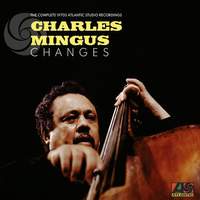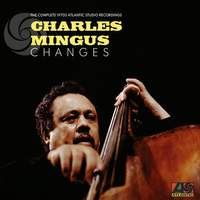Recommended New Release,
Charles Mingus - Changes: The Complete 1970s Atlantic Recordings

Jazziversaries are always something of a celebration. Both Dexter Gordon and Thad Jones are among the greats whose centenaries have already been commemorated this year and whose legacy will no doubt be memorialised across the jazz media and press in the weeks and months to come. But how about a reissue of pre-existing materials, framing them in succession thereby allowing listeners to perceive them in a new light? This is the case for one Charles Mingus, who arrived among us on April 22nd, 1923, before his untimely departure in 1979 at the age of 56. In light of this festive year, which has already seen special performances across the country, Rhino Records are releasing a new boxed set that spotlights the creative resurgence that defined the final phase of the legendary bassist and composer’s career.
The series gets cracking with Mingus Moves (1973), which picks up where the awe-inspiring Let My Children Hear Music (1971) left off – itself having served as Mingus’ initial re-entry into the studio for the first time in almost a decade (save for a brief but sporadic spell of dates in Paris and Tokyo which had occurred the year prior). It had been a rough couple of years for the musician, whose eviction from his home and troubles with alcoholism had been captured in an eponymously-titled documentary from 1968. But this resurgent streak on the Atlantic label represents a sort of rebirth for the mythic underdog. Joining Mingus and longtime drummer Dannie Richmond were newcomers Don Pullen, George Adams and Jack Walrath, whose instant bond came as the spark that quickly reignited the bandleader’s all-but-extinguished flame.

Concise liner notes and insight are provided by Canadian arranger and jazz scholar Andrew Homzy, who captures this return to form with a refreshing excitement as if reliving those days again for the first time: “In the last week of November, 1974, when I walked into the Montreal jazz club, ‘In Concert’, I heard a startling new Charles Mingus. All of the pieces were new to me. The quintet was dynamic. And Dannie Richmond had re-joined, as if he had never left. The trio of new, much younger musicians - Walrath, Adams, Pullen - met the strength of the powerhouse duo and rose to the challenge of Mingus’ latest compositions. I went every night. It was stunning”. What Homzy had witnessed in the flesh would soon end up on record as the dual-volume LP, Changes (1975). Writer and musician Brian Priestley states of the twin albums in his critical biography of the man: “This is a high-water mark, not only in the history of Mingus but in the history of jazz.” When we take a fresh look at this new phase in the composer’s life in the context of knowing it would prove to be his last, it's as if we too can rediscover the fabled story of this downtrodden artist who was only prevented from achieving his goals by his own personal demons.
Exclusive, never-before-heard tracks bookend this period of unbridled creativity, with unreleased takes of ‘Big Alice’ and ‘The Call’ from 1973 anticipating the eccentric audaciousness of ‘Music for Todo Modo’ from Cumbia & Jazz Fusion (1978), a rejected film-score that appears on the last album released during Mingus’ lifetime. The final two LPs, Me Myself An Eye (1979) and Something Like A Bird (1981), were put together following his diagnosis of Lou Gehrig’s Disease. Even though the bandleader was severely debilitated, he remained undeterred in his courageous battle to bring his musical visions to life as he dictated his direction from his wheelchair through the use of tapes and piano sketches. The magnitude of these recordings proves the late genius could be just as demanding as he was in his years of former glory, and in this, his anniversary year, it appears the ‘angry man of jazz’ and his later work are ripe for reappraisal.
The upcoming collection includes the last seven studio albums Mingus recorded for Atlantic Records between 1973 and his death in 1979 and a selection of outtakes – some previously unreleased. Changes: The Complete 1970s Atlantic Recordings will be released on June 23rd as a 7-CD set, an 8-LP set on 180-gram vinyl, digitally and for all streaming platforms. With special thanks to Andrew Homzy.
Available Formats: 8 Vinyl Records, MP3, FLAC, Hi-Res FLAC, Hi-Res+ FLAC
Available Formats: MP3, FLAC, Hi-Res FLAC, Hi-Res+ FLAC




